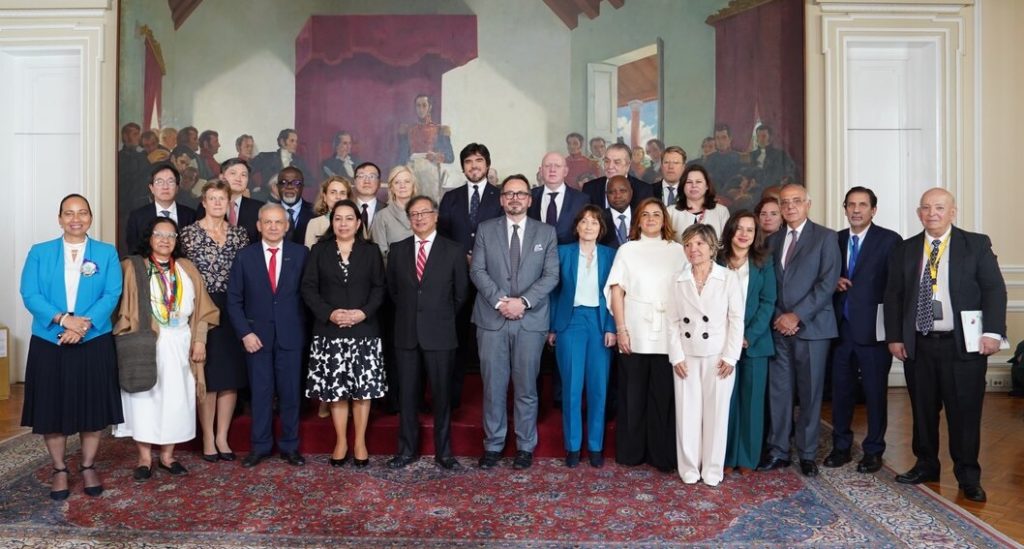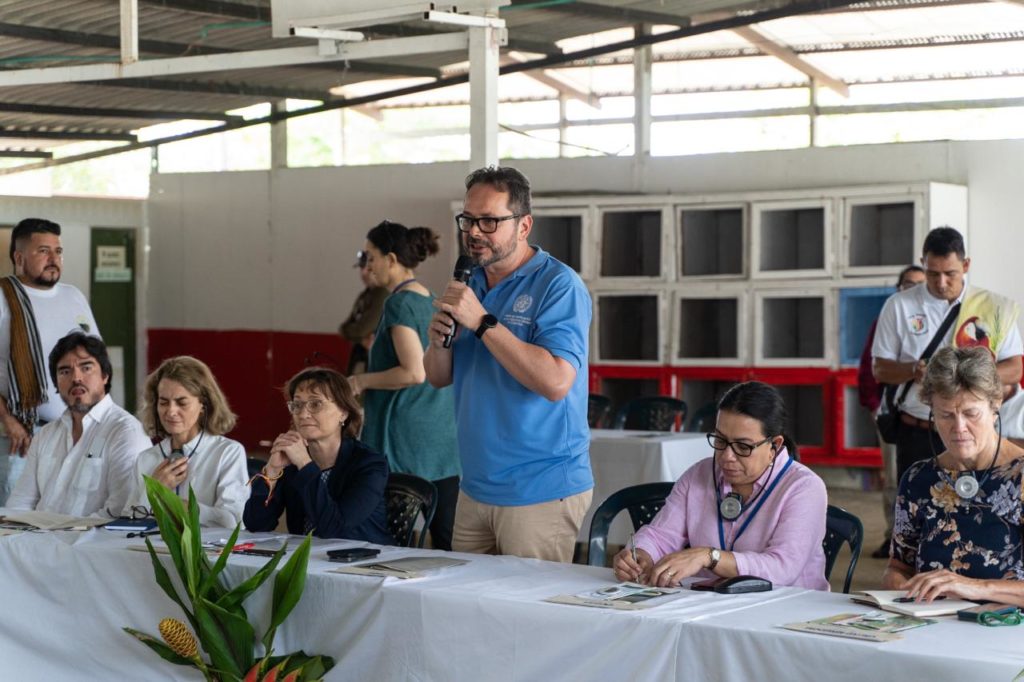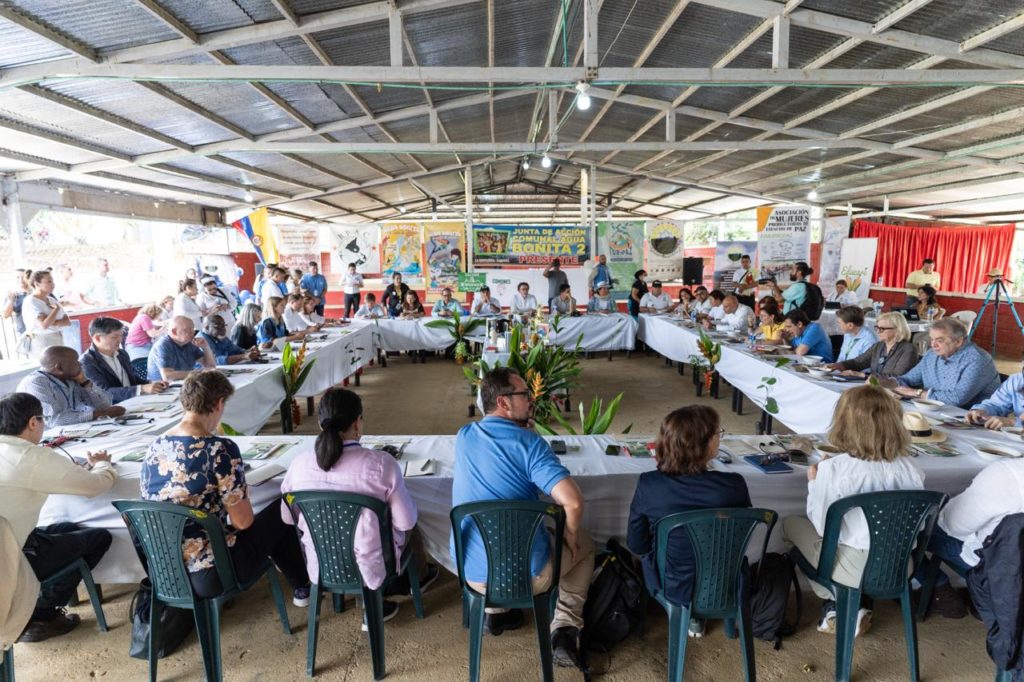
Delegates of the United Nations Security Council have been in Colombia since February 7 to verify compliance with the Havana peace agreement, signed between the Colombian State and the extinct FARC-EP in 2016 and which meant the demobilization of the most powerful and oldest guerrilla group in Latin America, after 52 years of illegal activity.
The international delegation arrived in Bogota on Wednesday night, and in addition to meeting with President Gustavo Petro, they will inspect on the ground the fulfillment of the peace agreements until next Sunday, February 11. The representatives of the world body will visit, between today and tomorrow, the departments of Caqueta and Valle del Cauca.
The UN delegation, composed of representatives of the permanent members of the Security Council: China, United States, France, United Kingdom and Russia, as well as the non-permanent members: Algeria, Ecuador, Slovenia, Guyana, Japan, Malta, Mozambique, Republic of Korea, Sierra Leone and Switzerland, will maintain a busy agenda during their four-day stay in the country.
“We are in Colombia to witness firsthand the progress made in these eight years of implementation of the 2016 Final Peace Agreement and to express the Security Council’s commitment to peace in Colombia,” said Ambassador Carolyn Rodrigues Birkett, representative of Guyana and the person who holds this month’s presidency of the Security Council.
First institutional day
The work began yesterday with a meeting with the President of Colombia, Gustavo Petro, and entities involved in the implementation of the Final Peace Agreement, the tribunal of the Special Jurisdiction for Peace (JEP), as well as members of Congress and signatories of the peace agreement. Through these meetings, the Security Council had the opportunity to express the support of the international community to the peace-building process in the country, as well as to evaluate the progress in the implementation of the peace agreement.
At the end of ex-president Juan Manuel Santos’ term, a year and a half after the signing, the administration of President Ivan Duque (2018-2022) meant a low degree of compliance with agreements of which he was critical. Due to this, the current president has recognized that there are still some delays in the signed commitments.
“The decision that I have taken in the face of this reality is that it is no longer the institutions that left the Santos government, which are small, rickety and without budget, that can achieve this implementation, but rather the entire national government, with the entire budget of the country, which is destined to solve the problem of social and territorial inequality in Colombia,” said President Petro.
At the end of his speech, the president pledged to be “the great coordinator of the implementation of peace,” an important challenge taking into account the difficulties evidenced just this week with the letter of the former FARC-EP leadership on the functioning of the transitional justice of the JEP.
In the afternoon, the UN delegates met with representatives of the JEP, congressmen, former FARC members, delegations from the current peace talks and the Office of the High Commissioner for Peace.
Field inspection
The agenda continued today with a visit to Caqueta, and is scheduled to continue tomorrow with a series of meetings in Valle del Cauca. Caqueta is a department that, in recent years, has been hard hit by the violence of various dissident groups of the former FARC-EP.
The members of the United Nations Council visited the Territorial Training and Reincorporation Area (ETCR) located in Aguabonita, which is home to 500 people belonging to 197 families. In the ETCRs, training and early reincorporation activities are carried out to facilitate the initial stages of adaptation of FARC-EP members to civilian life. Likewise, these actions are intended to make a positive contribution to the surrounding communities.
The international delegates have been able to talk and exchange impressions with various peace signatories who work from this space. “Our desire is that, in this visit, we see materialized part of the implementation of the peace agreement with respect to the reincorporation of us, the peace signatories in the framework of humanitarian action, specifically in the comprehensive action against mines,” said Marcela Moreno, a peace signatory in 2016.
Tomorrow, the visit will continue in Valle del Cauca.

Praise for Gustavo Petro’s Total Peace
The visit of the international delegates will also serve to address Colombia’s ongoing peace processes with other armed groups. Specifically, the National Liberation Army (ELN), and two dissident groups from the 2026 peace accords, the FARC Central General Staff and the Second Marquetalia.
In this regard, Pascale Baeriswyl, permanent representative of Switzerland to the UN Security Council, was full of praise for the peace policy of the Colombian presidency.
According to Pascale, “Colombia has set a positive example for the world. This peace process seeks peace as the basis and covers different areas to see negotiated solutions with different armed groups and with different elements of….civil society.”

See all the latest news from Colombia and the world at ColombiaOne.com. Contact our newsroom to report an update or send your story, photos and videos. Follow Colombia One on Google News, Facebook, Instagram, and subscribe here to our newsletter.

